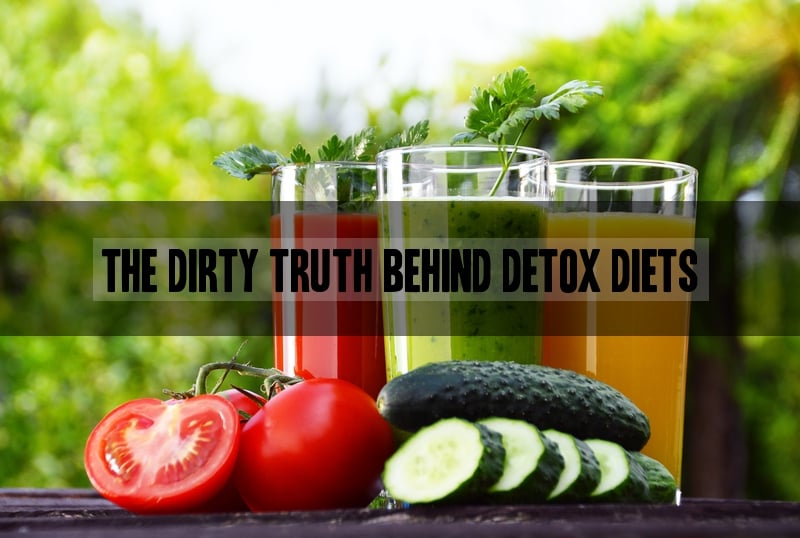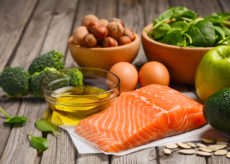The Dirty Truth about Detox Diets

There’s no doubt about it, the promises of detox diets and cleanses are alluring. Here’s a sampling of what you might hear or read:
- “Jump start your weight loss”
- ”Eliminate impurities”
- ”Drop 21 pounds in 10 days”
- ”Expel toxins”
- ”Revitalize and re-energize your body”
- ”Whisk away polluting nasties”
- ”Fast, easy weight loss”
- ”Purify the body”
- “Lose weight like the celebrities”
- ”Flush away toxins”
But do they work? Can they provide the health benefits they guarantee? Are they the perfect recipe that the proponents would like you to believe? Or, are they a recipe for disaster and self-sabotage, contributing to a vicious cycle and reinforcing poor eating habits and relationships with food?
What Does Detox EVEN Mean
One of the most challenging aspects of assessing the various detox diets and cleanses, which are typically characterized by severe food and calorie restriction, is that you’d be hard-pressed to find a specific scientific definition of either of these two interchangeable terms.
In the Detox Dossier, an investigation by the Voice of Young Science (VoYS) into 15 different products and special diets that are widely promoted as detoxes, a group of researchers found that no two companies use the same definition for “detox.” 1,2 Not only that, the VoYS found that no program or company could even name the supposed “toxins” targeted by its detox, and the proponents provided little—and in most cases, ZERO—evidence to back up their claims.
The VoYS concluded, “No one we contacted was able to provide any evidence for their claims, or give a comprehensive definition of what they meant by ‘detox.’ We concluded that ‘detox’ as used in product marketing is a myth. Many of the claims about how the body works were wrong and some were even dangerous.”
In other words, there’s virtually no agreement on what a detox diet is, and what’s more, not even the creators of these detox diets can verify what toxins they aid in eliminating nor provide any evidence that they actually “work.”
Your Body: The Detox Machine
While the detox industry promotes “purification,” “cleansing,” and “elimination,” it’s incredibly important to point that the human body has evolved highly sophisticated mechanisms for eliminating toxins. The liver, kidneys, gastrointestinal system, skin, and lungs all play a role in the excretion of unwanted substances, without chemical intervention. For example, the liver and kidneys both serve as exceptionally effective “detox” organs, converting toxic chemicals into less harmful ones and promoting the excretion of unwanted chemicals.
In its Debunking Detox Leaflet, the VoYS affirms, “Your body is capable of removing most potentially harmful chemicals you will encounter in your daily life. The human body has evolved to get rid of unnecessary substances through your liver, kidneys, and colon. It isn’t possible to improve their function without medical assistance.”3
Detox Diets: Too Restrictive?
Some might consider highly-restrictive detox diets, cleanses as “quick fixes,” but truth be told, they’re not really fixing anything. In fact, it’s more likely that they’re making things worse. You see, this type of approach lends itself to weight cycling, more commonly referred to as “yo-yo dieting,” which increases one’s risk of a variety of metabolic and cardiovascular issues.5–7 While very-low-calorie diets (VLCD) like these may lead to short-term weight loss, VLCDs do not lead to greater long-term weight loss compared to more moderate reduced-calorie diets.8
What’s more, through a process known as “adaptive thermogenesis,” your body will fight back against VLCD by drastically reducing metabolic rate, thyroid hormone, and the all-important fat-burning hormone leptin while also dramatically increasing hunger, appetite, and food reward systems.10 This dreaded combination puts you at a greater predisposition for weight regain.
Perhaps most importantly, these types of “plans” do little to teach you how to eat or help you overcome important limiting factors (e.g., creating a healthy food environment, preparing healthy food choices, cultivating a healthy relationship with food). Not only that, programs like these that heavily restrict both calories and specific foods and food groups make folks more prone to overconsumption of high-calorie, highly palatable foods.19 That’s right, good-tasting food becomes even tastier and junk food tastes like heaven in your mouth, and an even greater amount of it is craved by the body to satisfy its “needs.”
Conclusion
In the overall scheme of things, the way you look, feel, and perform are contingent on your entire body of “nutrition work”—not an individual food or special diet. In other words, there’s no “magic bullet.”
Rather than resorting to an extremist approach that does nothing to promote healthy eating behaviors, teach you how to eat, encourage a healthy relationship with food, or promote a healthy food environment, focus on making changes that support long-term healthy habits. Not only do you not have to suffer and deprive yourself through excessive restriction, you can enjoy great-tasting whole foods and fully support your health and body composition goals.
Start where you are and make small changes that you are ready, willing, and able to take on; focus on mastering those new behaviors, one step at a time.






